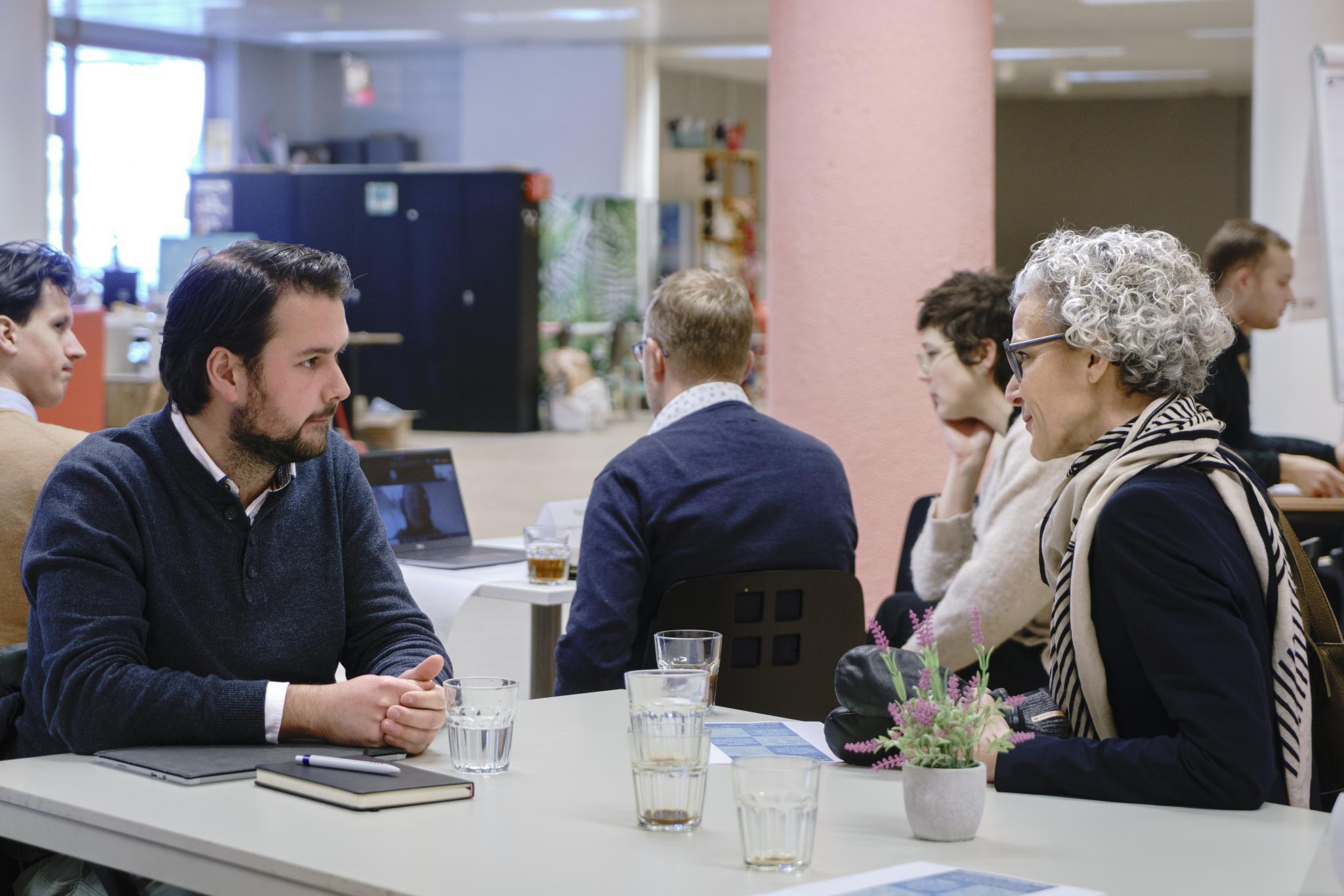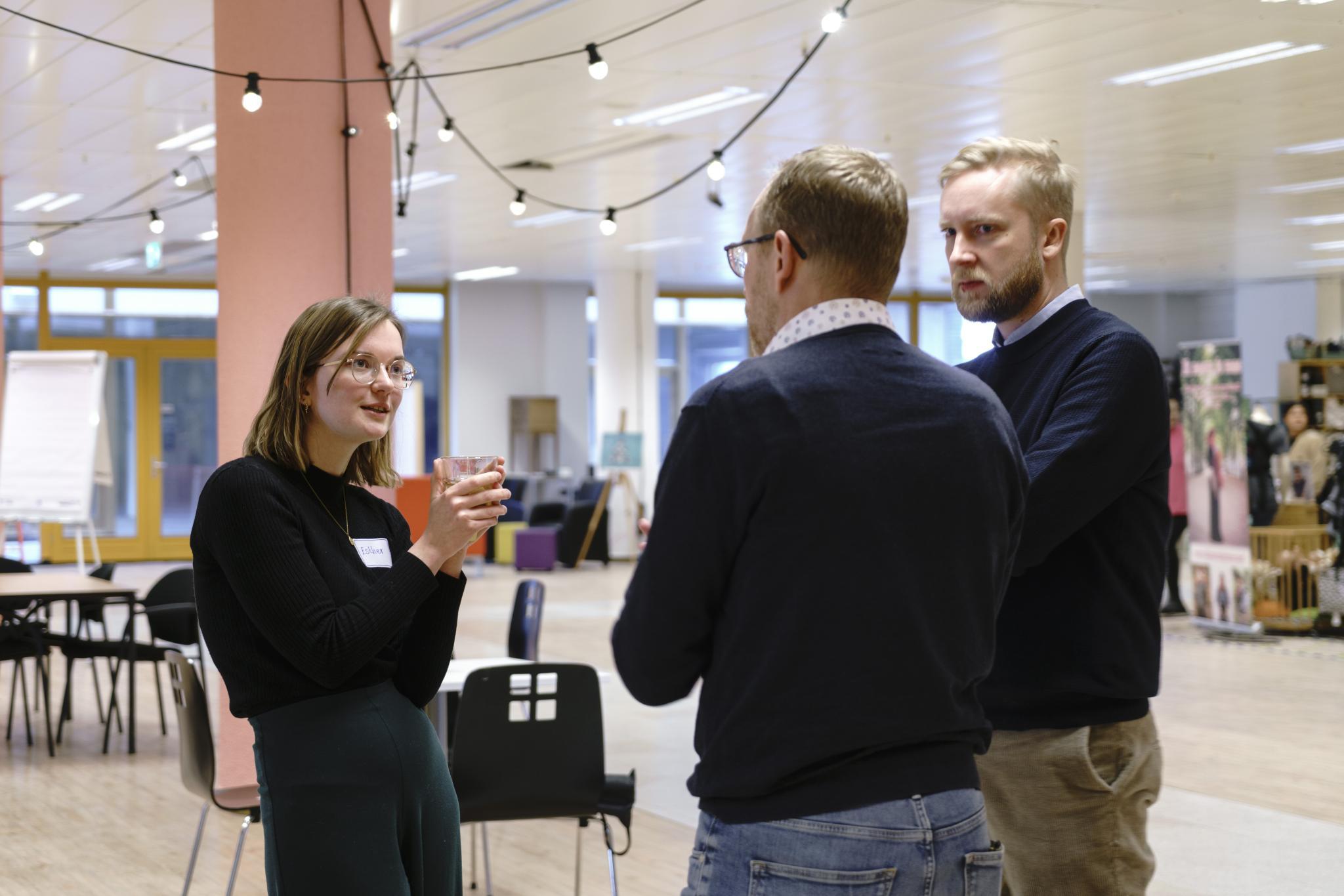Originally found on LDE BOLD Cities page. Original words by Esther Eumann.
On February 10, the students of The Hague Southwest Thesis Hub (Scriptiewerkplaats Den Haag Zuidwest) and interested stakeholders and academics came together at Pand Zuidwest to discuss what the students found out during their thesis. In an interactive setting, students, stakeholders, and academics shared and exchanged knowledge and know-how.
The Hague Southwest Thesis Hub is an initiative by the Leiden-Delft-Erasmus Centre for Governance of Migration and Diversity and the municipality of The Hague. Master’s students from Leiden University, Delft University of Technology, and Erasmus University Rotterdam write their master thesis on practice-based challenges by, among others, the municipality of The Hague, projects in The Hague Southwest and its residents. At the end of their project, they not only submit their thesis but also a practical product for their stakeholders. The thesis hub culminates in a final meeting, where students give back what they learned to their stakeholders but also their research site.

about his thesis research.
One of the students this year was Sjoerd Jansma, master's student in public administration at Leiden University, who researched which factors impact whether inhabitants of The Hague would (or would not) like to participate in the city's Urban Digital Twin. “I really valued sitting down with stakeholders right at the beginning of my project. That really allowed me to see the practical relevance of my research and facilitated the ‘translation’ from theory into practice.”
Urban Digital Twin
An Urban Digital Twin is a digital copy of a city. The technology ranges from a simple 3D-model to a model which can process real-time data and make their own prediction. Regarding participation, Urban Digital Twins might be used to design and visualize plans that municipalities or citizens have to transform their neighborhood by creating for instance a new park or altering the existing lay-out of public space.
Sjoerd’s thesis was supervised by dr. Carola van Eijk, who is in turn connected to a Team Science research project on Urban Digital Twins from the Leiden-Delft-Erasmus Centre for BOLD Cities. Carola is part of this research project together with dr. Achilleas Psyllidis, dr. Roy Bendor (both from TU Delft), dr. Jess Bier, dr. Thomas Swerts and Isa Sanchez Cecilia (all from Erasmus University). The latter two were also present at the final session, attentively listening to and discussing Sjoerd’s presentation.In our research [...] we critically examine how inclusive the development of Urban Digital Twins really is and whether they can actually help citizens to have a stronger voice in the city."
In our research [...] we critically examine how inclusive the development of Urban Digital Twins really is and whether they can actually help citizens to have a stronger voice in the city."
Thomas: “In our research for the Centre for BOLD Cities we critically examine how inclusive the development of Urban Digital Twins really is and whether they can actually help citizens to have a stronger voice in the city.” “Urban Digital Twin programs are full of visions and fine promises, but those are all in the future," Isa adds, “We want to research what is happening right now so so we can also shape the process.”
While diving deeper into what a Urban Digital Twin is, Carola made the connection to Mandy Koenraads and the Scriptiewerkplaats. “We wanted to connect our research with what’s happening in practice so that with our research findings we can both contribute to the academic as well as the social debate. Through the Scriptiewerkplaats we were able to then connect that to education as well.”
Sjoerd’s research then formed a first step in that exploration of what it takes to make Urban Digital Twins more inclusive and supportive of citizen participation. Carola: “We will use the insights and knowledge from Sjoerd, my other students, and Thomas’ students in Rotterdam in our research project on Urban Digital Twins. I really see this as a constant interplay between research, education and the ‘real world’.”

Thomas and Carola stress the added value of a collaboration between Leiden-Delft-Erasmus. Although working interdisciplinary comes with its own challenges, it is great to make use of all the knowledge and skills other researchers and students have in store. Thomas: “I am very enthusiastic about having students from TU Delft actually design something for us that we can then use in the co-creation sessions that we are planning to organize with citizens and the municipality.”
The added value of thesis hubs
For Carola, working with a thesis hub like the Scriptiewerkplaats Den Haag Zuidwest has a clear added benefit. Students not only learn research skills but also what happens in the ‘real world’, how to work there and give something concrete back to their research environment. Her advice to other teachers who are thinking about supporting students through a thesis hub: “Just do it! It is so much more fun, for your students and yourself! As teachers, we are uniquely positioned to make that connection between education, research and the ‘real world’.” The meeting organized by the thesis hub also allowed Carola and Thomas to make a deeper connection between the LDE Centres for BOLD Cities and Governance of Migration and Diversity.
Photos by Nesie Wang
